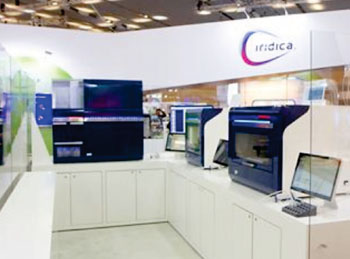Innovative Technology Identifies Broad Range of Pathogens
By LabMedica International staff writers
Posted on 23 Sep 2014
A platform has been developed with the goal to deliver a broad range of tests that can identify hundreds of bacteria, fungi, and viruses directly from a patient specimen within eight hours.Posted on 23 Sep 2014
The pioneering testing technology could reduce hospital stays by up to eight days and lower annual health care costs for people with serious infections by approximately USD 2.2 million.

Image: The diagnostic platform system IRIDICA for the identification of pathogens (Photo courtesy of Abbott).
The cost reductions were based on a health economic model from the RApid Diagnosis of Infections in the CriticAlly IlL (RADICAL) study. An independent, expert panel of physicians reviewed the RADICAL study results from samples obtained from 420 critically ill patients with suspected severe infections from the United Kingdom, France, Belgium, Poland, Switzerland, and Germany.
The RADICAL study indicated that polymerase chain reaction/Electrospray Ionization Mass Spectrometry or PCR/ESI-MS (Abbott, Abbot Park, IL, USA) has the ability to detect the source of the infection such as bacteria, fungi, or viruses, within hours, even when blood cultures, the current standard of care, are negative. This information could help doctors diagnose and initiate appropriate treatments more quickly.
The platform known as IRIDICA currently differentiates between 600 bacterial families, as well as 200 families of fungi and 13 families of viruses. The PCR/ESI-MS technology may offer the potential for earlier discontinuation of broad-spectrum antibiotics. After retrospectively comparing Abbott's technology versus culture, the physicians reported they would have prescribed a different course of treatment in 57% of the cases evaluated based on the Abbott technology results.
Jean-Louis Vincent, MD, PhD, professor of Intensive Care at the Universite Libre de Bruxelles (Brussels, Belgium) said, “More than 50% of blood culture tests come back negative, even when infections are believed to exist. The results of the RADICAL study and the economic analysis suggest the Abbott technology will provide actionable information much earlier, allow physicians to improve patient outcomes and may ultimately lower overall health care costs related to these serious infections.” The IRIDICA platform is expected to be available as a Conformité Européenne (CE) marked in vitro diagnostic device in European countries within the coming months. The study was presented at the 54th Interscience Conference on Antimicrobial Agents and Chemotherapy held September 5-9, 2014, in Washington DC (USA).
Related Links:
Abbott
Universite Libre de Bruxelles














